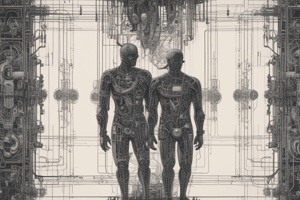Podcast
Questions and Answers
What happens when a multiple-copy machine encounters a symbol that doesn't appear on any of the existing arrows?
What happens when a multiple-copy machine encounters a symbol that doesn't appear on any of the existing arrows?
- That copy of the machine dies. (correct)
- It splits into more copies.
- It moves to an accept state.
- It stays in the same state.
When an NFA is in an accept state at the end of the input, what does it mean?
When an NFA is in an accept state at the end of the input, what does it mean?
- The NFA stays in the same state.
- The NFA rejects the input string.
- The NFA dies.
- The NFA accepts the input string. (correct)
What happens when an € symbol is encountered on an existing arrow?
What happens when an € symbol is encountered on an existing arrow?
- The machine dies.
- The machine stays in the same state.
- The machine moves to an accept state.
- The machine splits into multiple copies. (correct)
What is the primary difference between a DFA and an NFA?
What is the primary difference between a DFA and an NFA?
What is the purpose of an NFA?
What is the purpose of an NFA?
Study Notes
Nondeterminism
- Nondeterminism is a concept that has had a great impact on the theory of computation.
- In a nondeterministic machine, several choices may exist for the next state at any point.
- Nondeterminism is a generalization of determinism, so every deterministic finite automaton is automatically a nondeterministic finite automaton.
Nondeterministic Finite Automata (NFA)
- An NFA may have additional features compared to a deterministic finite automaton (DFA).
- In an NFA, a state may have zero, one, or many exiting arrows for each alphabet symbol.
- An NFA may have arrows labeled with members of the alphabet or ε.
- Zero, one, or many arrows may exit from each state with the label ε.
How does an NFA compute?
- When running an NFA on an input string and coming to a state with multiple ways to proceed, the machine splits into multiple copies of itself and follows all the possibilities in parallel.
- If there are subsequent choices, the machine splits again.
- If a copy of the machine is in an accept state at the end of the input, the NFA accepts the input string.
- If an ε symbol is occurring on an existing arrow, the machine splits into multiple copies, one following each of the exiting ε-labeled arrows, and one staying at the current state.
Example NFA
- The NFA N1 recognizes the language consisting of all strings over {0,1} containing a 1 in the third position from the end.
- The NFA N2 recognizes the language A, which consists of all strings over {0,1} containing a 1 in the third position from the end.
- The NFA can be converted into an equivalent DFA, but the DFA may have many more states.
Converting NFA to DFA
- Converting an NFA into an equivalent DFA may result in a DFA with many more states.
- The procedure for converting NFA to DFA will be illustrated later.
Studying That Suits You
Use AI to generate personalized quizzes and flashcards to suit your learning preferences.
Related Documents
Description
This quiz covers the concept of nondeterminism in Theory of Computation, specifically in the context of Finite Automata. It explores how nondeterminism impacts the computation process.



